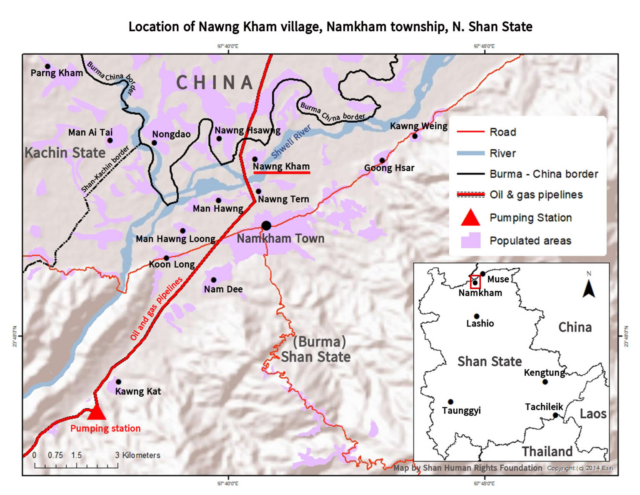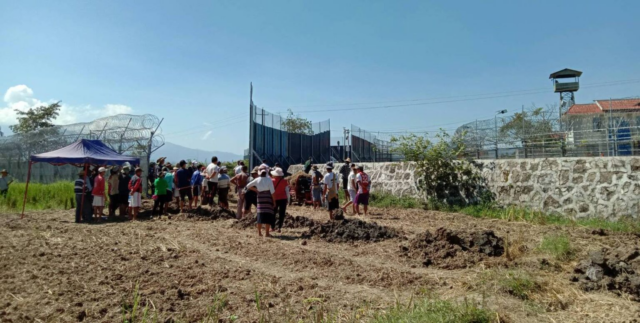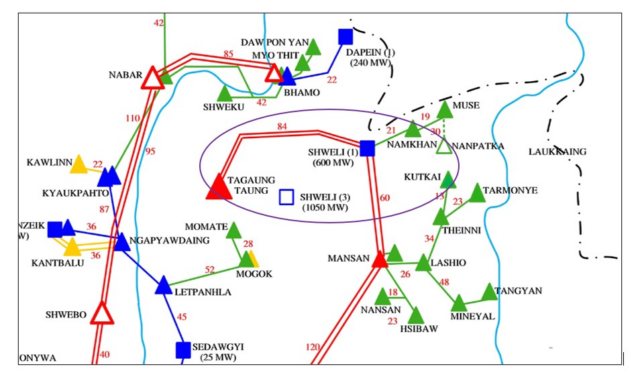Namkham villagers suffer from year-long electricity cut by China due to border dispute
05 July 2022

Update by the Shan Human Rights Foundation
July 5, 2022
Namkham villagers suffer from year-long electricity cut by China due to border dispute
Residents of Nawng Kham village in Namkham township, northern Shan State, have been suffering from electricity shortage since China cut off their power supply in July 2021 over a border demarcation dispute.
Nawng Kham village, comprising 161 households, lies on the northern bank of the Mao (Shweli) river close to the Chinese border. Although Nawng Kham is only two kilometers north of Namkham town, there are no connecting power lines across the Mao/Shweli river, so Nawng Kham villagers have relied for years on electricity from the nearby village of Nawng Hsawng in China.

In October 2020, Chinese authorities began building a double layer of fencing, 15 to 20 meters apart, along the border close to Nawng Kham, citing the need to prevent the spread of Covid-19. The fencing, 7 meters high on the China side and 5 meters high on the Burma side, cut through fields straddling the border, causing a loss of income for some farmers.
Then, without warning, on July 10, 2021, workers from China began building a new layer of fencing which encroached into the fields of Nawng Kham villagers. Nawng Kham residents came out and stopped them, and called the Namkham township administrator and land survey department officials to the site. They also called officials from the China side, but the Chinese officials did not appear.

Villagers stopping Chinese workers from building new fencing on their farmland
On July 18, 2021, at 6 am, about 50 workers from China again returned to the same place, and used a backhoe to begin digging holes for the fence posts. Again, villagers from Nawng Kham went to stop them, forcing the Chinese workers to abandon their backhoe and digging tools and retreat to the China side. At that time, three Chinese military trucks were patrolling on the other side of the border.
On the same day, villagers again called the Namkham township authorities to come and solve the dispute with the Chinese authorities, saying they did not want to lose their land. It was then agreed by both sides to stop building the new fencing. The Chinese workers filled in the holes already dug and took back their digging equipment.
Two days later, on July 20, 2021, at 10 am, the Chinese electricity supply to Nawng Kham was suddenly cut off from Nawng Hsawng village. The villagers appealed to the Chinese electricity officials in Ruili, who said they had instructed the villagers of Nawng Hsawng to reconnect the electricity, but the power was not reconnected for three months. During this time, the Nawng Kham villagers had to buy diesel generators and solar panels for their electricity. Poorer families had to rely on candles.

On October 10, 2021, the Chinese electricity authorities fined Nawng Hsawng village 7,000 yuan for failing to provide electricity to Nawng Kham, and the power was reconnected that evening. However, on October 19, 2021 there was a fire in a house in Nawng Kham, and the electricity was again cut off. The Nawng Kham villagers again contacted the Chinese electricity officials to reconnect the power, but the officials said they were too busy to deal with the issue, and finally did not even answer phone calls from the villagers. The electricity has been cut off until today.
The Nawng Kham villagers have been buying electricity from the China side for 20 years. They paid for the installation of Chinese meter boxes in 2002, each meter box costing 560 yuan. They originally paid 1 yuan per unit of electricity, but after the Shweli 1 hydropower project became operational in 2009, the cost was reduced to 0.6 yuan.
Local villagers assume the power cut is because of their opposition to China’s attempts to extend the border into their lands. The disputed location is precisely where China is planning a new cross-border road and bridge over the Mao/Shweli River to Namkham, which locals fear may cause further loss of land.
Given that China is already gaining significant benefits from the Shweli 1 hydropower project in Namkham, it is regrettable that Chinese authorities are withholding electricity from local Namkham residents for household use.


Existing Power Grid and Under Construction Projects from www.moee.gov.mm
The Shweli 1 project is a joint venture between China’s Yunnan United Power Development Co. Ltd. and Burma’s Ministry of Electric Power, built under a 40-year Build-Operate-Transfer (BOT) agreement. Out of the project’s installed capacity of 600 megawatts, 400 MW is for use in Burma, while 200 MW is for export to China. However, a large portion of the hydropower from Shweli 1 is sent directly via a high voltage transmission line to the Tagaung Taung nickel processing plant near Tigyaing in Sagaing, operated by China Nonferrous Metal Mining Group.
Nawng Kham residents have already suffered impacts from other Chinese investment projects, including China National Petroleum Corporation’s transnational oil and gas pipelines, which pass only 200 meters west of their village. In 2010, when the pipelines started being laid, local farmers received unsatisfactory compensation for the digging up of their fields, while suffering from increased Burma Army security and laying of land mines. In 2011, a farmer called Loong Aung Nyunt from Aung Myat Thar ward in Namkham town stepped on a land mine in his field near where the gas pipeline was being laid, and was seriously injured. Villagers living near the pipelines remain in fear of possible leakage or explosion.
Nawng Kham residents were also impacted by the construction of the Longjiang hydropower dam on the Mao/Shweli river in Yunnan province in 2010. Thousands of downstream villagers in northern Shan State have faced livelihood disruption due to sudden fluctuations in the river level, causing grounding of ferry boats and flooding of farmland. The dam’s blockage of sediment has also accelerated river bank erosion, a problem worsened by Chinese-sponsored sand mining, including next to Nawng Kham. Most of the sand is exported for construction projects inside China, causing problems of dust pollution during transport.
Contact
Sai Hor Hseng +66: 94-728-6696 (Shan, English)
Sai San Loi +66: 88 680 4913 (Shan, Burmese)
Ying Leng Harn +66: 62 569 5220 (Shan, Burmese)
Announcements
21 May 2025
Open letter: Malaysia must lead ASEAN with principle, not hypocrisy, to address the Myanmar crisis

Progressive Voice is a participatory rights-based policy research and advocacy organization rooted in civil society, that maintains strong networks and relationships with grassroots organizations and community-based organizations throughout Myanmar. It acts as a bridge to the international community and international policymakers by amplifying voices from the ground, and advocating for a rights-based policy narrative.